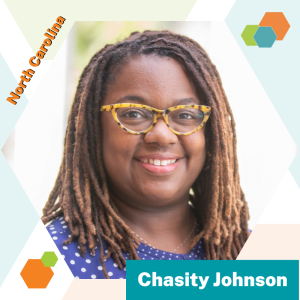Meet intersection of skills advocate Chasity Johnson, department chair of Human Environmental Sciences and assistant professor – Family and Consumer Sciences at Meredith College in Raleigh, North Carolina. She is a Fellow in the third cohort of the Postsecondary State CTE Leaders Fellowship at Advance CTE – Sponsored by ECMC Foundation.
Many people remember “Home Economics” without realizing it has evolved and expanded into what we now know as Family and Consumer Sciences. FCS courses prepare students for life by connecting academic learning with real-world application.
 Q: Let’s start with your journey into CTE. How did your background shape your path into this field?
Q: Let’s start with your journey into CTE. How did your background shape your path into this field?
A: My professional journey began in banking and finance, but it wasn’t until I stepped away from the workforce to focus on raising my children that I discovered my true passion for teaching and education. Drawing on my undergraduate degree in merchandising, I pursued a teaching license, and Family and Consumer Sciences (FCS) Education was the perfect fit. It was one of the best decisions I’ve made. FCS is inherently interdisciplinary, which has allowed me to weave together my interests in personal finance, apparel design and merchandising, child development, and nutrition, all under one umbrella.
I began as a middle school FCS teacher, and now I have the privilege of working with undergraduate students who are pursuing their own teaching licenses in the field. What’s especially rewarding is helping others see the value and relevance of FCS today. Many people remember “Home Economics” without realizing it has evolved and expanded into what we now know as Family and Consumer Sciences. FCS courses prepare students for life by connecting academic learning with real-world application.
I believe it is important that we take into account prior learning and instruction to create systems that support students at any stage of the process.
Q: Credit for prior learning at postsecondary institutions has gained traction in a workforce-centric economy. How do you address this challenge at your institution and in North Carolina?
A: Awareness of the issue is key, so examining existing systems, asking questions, and considering new paths has been my approach to this challenge. North Carolina has such strong Career Technical Education (CTE) programs, which include Family and Consumer Sciences, that provide students with incredible, future-focused education and internship opportunities. These students are earning valuable credentials and certifications, which are positioning them well for employment.
I believe it is important that we take into account prior learning and instruction to create systems that support students at any stage of the process. Through my recent research, I surveyed faculty and staff in Family and Consumer Sciences programs to understand their perceptions and identify policy gaps. Linear paths are oftentimes easier to create and implement from a policy and procedure standpoint, but these may not be beneficial to all students.
By not offering credit for their prior learning, we risk disengaging the very students we’re trying to support.
Q: You’ve been vocal about the need to explore the perceptions and procedures for providing academic credit for credentials earned within secondary FCS programs. Why do you think this is such a crucial issue?
A: Students are doing the work, and it is important that we recognize it. When those same students enroll in postsecondary programs, they’re often asked to retake courses that cover content they’ve already mastered. This leads to redundancy, frustration, and in some cases, barriers to persistence. By not offering credit for their prior learning, we risk disengaging the very students we’re trying to support.
Exploring this issue helps us to create a truly student-centered ecosystem, as envisioned by Advance CTE’s CTE Without Limits framework. Also, by removing the barrier and providing credit for prior learning, we create an opportunity to increase the pipeline of future CTE teachers and professionals.
Q: You’ve spoken before about the need to conduct qualitative research on colleges and instructors’ perceptions of credit for prior learning. Can you share how this commitment has shaped your leadership and actions in your current role?
A: I’m constantly looking for ways to improve the student experience and eliminate unnecessary barriers. Conducting qualitative research on faculty perceptions helped me realize that change must start with conversation and awareness. Advocating for small policy shifts can lead to big impacts. It can be easy to go about this work in isolation, but working on this recent research has made me aware of the importance of collaboration in bringing about change.
Q: What do you see as the future of CTE in North Carolina and what challenges do you think need to be addressed?
A: The future of CTE in North Carolina continues to be strong. The state has made clear commitments to embedding credentialing into high school curricula and connecting education to the workforce. An alignment between secondary and postsecondary systems would ensure students don’t lose momentum when they transition from one level to the next.
That includes developing statewide policies for credit for prior learning, improving articulation agreements, and fostering better communication between high school educators and college faculty. If we can address these gaps, we’ll not only strengthen CTE pathways but also make them more accessible to all students.
If we build systems that truly reflect and respect the experiences of all students, the outcomes will follow.
Q: You’re clearly passionate about creating long-term change. What advice would you give to others who want to make a difference in CTE and postsecondary participation and attainment?
A: Start by listening to students, faculty, and community partners. Find out where the gaps are and be willing to question long-standing procedures. I would also suggest that we not be afraid to try out new ideas and be transparent about the “why” behind our work. Change requires collaboration and a willingness to disrupt outdated systems. Most importantly, keep the focus on the learner. If we build systems that truly reflect and respect the experiences of all students, the outcomes will follow.
The Fellowship has provided a space for me to strengthen my leadership skills and expand my impact by learning from others who are navigating similar challenges in different contexts.
Q: As a participant in Advance CTE’s National Fellowship, what do you hope to gain from this experience?
A: Being a part of Advance CTE’s network of leaders has allowed me to gain new insights, tools, and policy frameworks that I can bring back to my institution and state. The Fellowship has provided a space for me to strengthen my leadership skills and expand my impact by learning from others who are navigating similar challenges in different contexts. I see this as a catalyst for both personal growth and systemic change. It is certainly leading the way to more inclusive, responsive, and future-ready CTE programs.
Chasity’s journey to CTE leadership is an atypical example of blending specific lifestyle needs and expertise into a career fueled by passion and a desire to be responsive to learner needs. Her insights are just one example of the incredible work being done by the fellows of the Advance CTE National Fellowship.
To learn more about Chasity and other inspiring leadership fellows, visit the Postsecondary State CTE Leaders Fellowship page, where Fellows redefine pathways based on learner and industry needs and highlight the successes of flexible career pathways with multiple entry and exit points.
Interested in developing your own CTE leadership fellowship in your state? Request more information via our request form or contact Dr. Kevin R. Johnson Sr. at [email protected].

